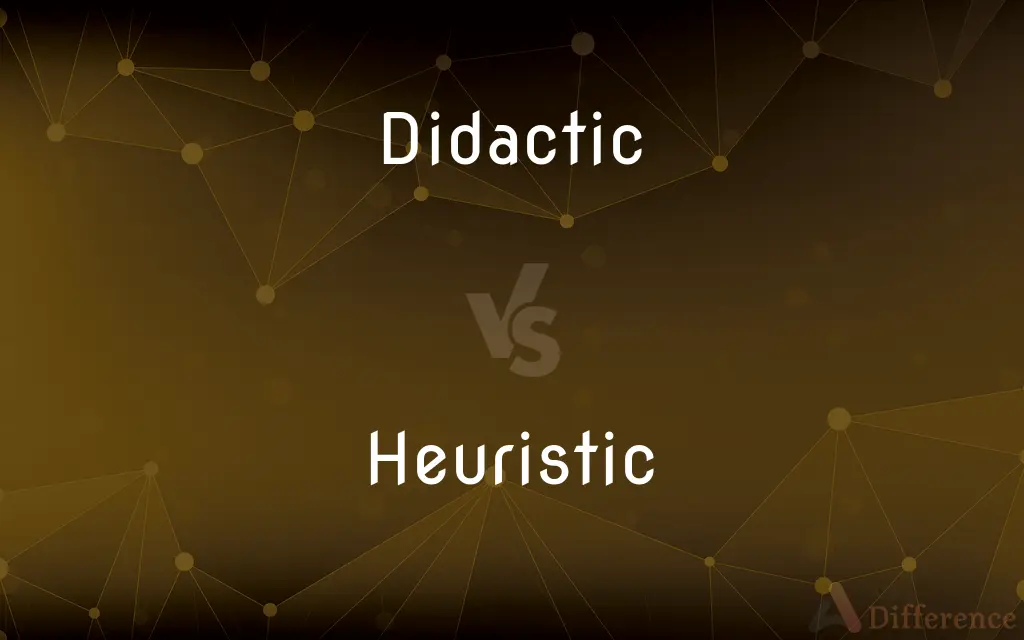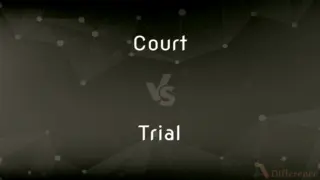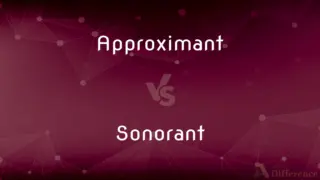Didactic vs. Heuristic — What's the Difference?

Difference Between Didactic and Heuristic
ADVERTISEMENT
Compare with Definitions
Didactic
Intended to teach, particularly in having moral instruction as an ulterior motive
A didactic novel that set out to expose social injustice
Heuristic
A heuristic (; from Ancient Greek εὑρίσκω (heurískō) 'I find, discover'), or heuristic technique, is any approach to problem solving or self-discovery that employs a practical method that is not guaranteed to be optimal, perfect, or rational, but is nevertheless sufficient for reaching an immediate, short-term goal or approximation. Where finding an optimal solution is impossible or impractical, heuristic methods can be used to speed up the process of finding a satisfactory solution.
Didactic
Intended to instruct.
Heuristic
Of or relating to a usually speculative formulation serving as a guide in the investigation or solution of a problem
"The historian discovers the past by the judicious use of such a heuristic device as the 'ideal type'" (Karl J. Weintraub).
Didactic
Morally instructive.
ADVERTISEMENT
Heuristic
Of or constituting an educational method in which learning takes place through discoveries that result from investigations made by the student.
Didactic
Inclined to teach or moralize excessively.
Heuristic
(Computers) Relating to or using a problem-solving technique in which the most appropriate solution of several found by alternative methods is selected at successive stages of a program for use in the next step of the program.
Didactic
Instructive or intended to teach or demonstrate, especially with regard to morality.
Didactic poetry
Heuristic
A heuristic method or process.
Didactic
Excessively moralizing.
Heuristic
Heuristics (used with a sing. verb) The study and application of heuristic methods and processes.
Didactic
(medicine) Teaching from textbooks rather than laboratory demonstration and clinical application.
Heuristic
(of an approach to problem solving, learning, or discovery) That employs a practical method not guaranteed to be optimal or perfect; not following or derived from any theory.
Didactic
(archaic) A treatise on teaching or education.
Heuristic
That provides a useful, but not optimal, solution to a problem. Such algorithms are typically employed either because the only known algorithms that provide optimal solutions use too much time or resources, or else because there is no known algorithm that provides an optimal solution.
Didactic
Fitted or intended to teach; conveying instruction; preceptive; instructive; teaching some moral lesson; as, didactic essays.
The finest didactic poem in any language.
Heuristic
(of an argument) That reasons from the value of a method or principle that has been shown by experimental investigation to be a useful aid in learning, discovery and problem-solving.
Didactic
Excessively prone to instruct, even those who do not wish to be instructed; - of people.
Heuristic
A heuristic method.
Didactic
A treatise on teaching or education.
Heuristic
The art of applying heuristic methods.
Didactic
Instructive (especially excessively)
Heuristic
(computing) A heuristic algorithm or method.
Heuristic
Serving to promote discovery or learning; - used especially of thories or paradigms which stimulate new ideas for discovering facts in experimental sciences.
Heuristic
Serving to stimulate people to learn and discover on their own, especially by encouraging experimental and trial-and-error methods for solving problems.
Heuristic
Pertaining to or based on trial-and-error and experimental methods of learning and evaluation.
Heuristic
Based on the use of an efficient trial-and error method to search a space of possible solutions to a problem, or to find an acceptable approximate solution, when an exact algorithmic method is unavailable or too time-consuming.
Heuristic
A heuristic method; a specific heuristic procedure.
Heuristic
A theory or approach which serves to promote discovery or learning by encouraging experimentation.
Heuristic
A commonsense rule (or set of rules) intended to increase the probability of solving some problem
Heuristic
Of or relating to or using a general formulation that serves to guide investigation
Share Your Discovery

Previous Comparison
Court vs. Trial
Next Comparison
Approximant vs. Sonorant













































